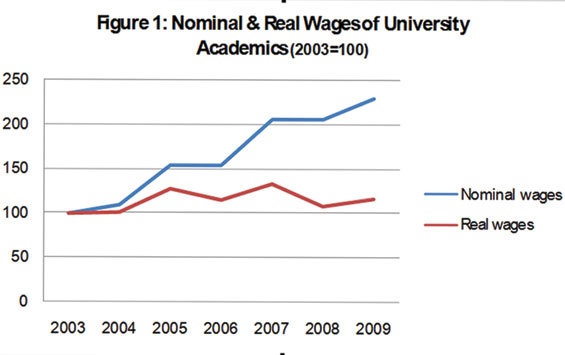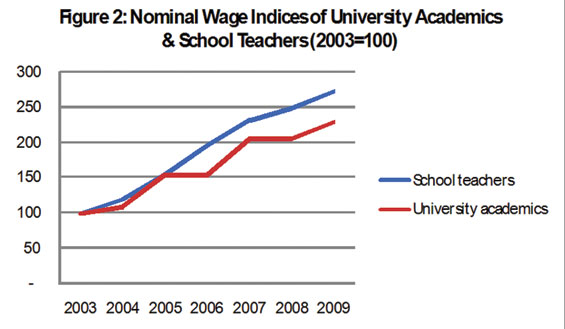Human resources development is considered a crucial factor in promoting economic growth in recent times. Needless to say that education is instrumental in enhancing the quality of human resources in any economy. In contrast to the fast growing South East Asian nations, a major constraint to economic growth in many developing countries such as ours is the dearth of human resources that are essential to run modern industries and businesses. This has adversely affected the country’s productivity levels and economic growth. Developed countries achieved faster economic growth mainly by means of productivity increases emanated from high quality human resources.
Global context
World-wide, university staff plays a key role in facilitating nations to achieve better positions in the highly competitive global markets. Therefore, it is essential to attract and retain the best intellectuals within the national university system. In this regard, adequate compensation for the academic staff becomes an important consideration in national development as well as in the global context. Compensation is also a key factor affecting brain drain and brain gain. Across the globe, the average monthly salaries of academic staff range from $1,180 in China to $4,900 in Canada. The salaries of academics in some western developed countries are much higher. It may be rather unrealistic to compare these wages with wages of the university academic community in Sri Lanka, given the country’s poor economic conditions. It would suffice to mention here that the average gross salary of a Senior Lecturer here is as low as $500 per month.
Local conditions
Leaving aside the global comparisons, Sri Lankan academics are in a disadvantageous position even in the local context. Their salaries are much lower in comparison with the salary structures of the industrial, banking and businesse sectors. On equity or egalitarian grounds, one could argue that salaries should be equal across different occupations or sectors. But considering the additional household resources spent and longer time sacrificed to attain higher educational levels, those who have acquired higher education should be adequately compensated. That is a fundamental principle of Economics of Education. If compensation or the rate of return is inadequate, there is no point in acquiring higher education at a greater opportunity cost. Inadequate compensation compels qualified persons to go out of the country to find greener pastures elsewhere. This is what has happened in the past in Sri Lanka. Apart from limited job opportunities caused by factors such as slow economic growth and the ethnic conflict, relatively low salaries have been a key factor that motivated many qualified persons to migrate, which resulted in brain drain. University academics who produce intellectuals are the worse affected by the salary stagnation. Hence, it is a daunting task to retain the skeleton academic staff currently remaining in the national university system in the midst of this unfavourable situation.
Decline in Real Wages
of Academics
Let us now look at the salient trends in the salaries of university academics. In order to analyze the trends, we consider here the salary scales of senior lecturers as a proxy. In nominal or money terms, the monthly basic salary of Senior Lecturers in Gade II rose from Rs. 18,325 in 2003 to the present level of Rs. 42,500. However, this increase was not sufficient to compensate for the high inflation experienced in recent years. This can be illustrated by adjusting the nominal salaries for inflation. For this purpose, we derived the real wage figures by deflating the nominal wages by the Colombo Consumer Price Index (New). As illustrated in Figure 1, the real salary level (nominal wages adjusted for inflation) of senior lecturers has been stagnant over the years, despite the increase in salary in nominal or money terms. In fact, the real salary index (2003=100) declined from 127 in 2005 to 117 in 2009. The high inflation during the period 2005-2008 led to erode the real value of salaries
In comparison with the salaries of the government school teachers, the university lecturers have been worse-off. As shown in Figures 2, the nominal wage index of school teachers rose faster than that of university academics. The nominal wage index of school teachers rose from 100 in the base year of 2003 to 272 by 2009 whereas the nominal wage index for university academics was only 229 in 2009. This is reflected in the real wage gap between university academics and school teachers. In 2009, the real wage index for school teachers was 139 as against 117 for university academics. This comparison is not intended, in any way, to object or to resist the salary increases of school teachers but to show the continuous deterioration of the relative financial position of university academics.
Brain Drain vs. Brain Gain
The salaries of the university academic staff have not been increased in tandem with the salary increases in the financial or private sector entities. The financial institutions provide a wide range of fringe benefits (annual bonus, medical benefits, pension, overseas scholarships and training facilities etc.) in addition to attractive salaries. Private sector industry and enterprises also offer attractive benefits to graduates to attract the best qualified personnel. As a result, the salaries of university academic staff have deteriorated even in nominal terms in comparison with other semi-government institutions and private sector industry.
The outcome is that the national universities have been unable to retain their own best graduates in the academic staff. About three decades ago, the best qualified graduates with first or second-upper classes inclined to join the university staff, given the competitive salary scales and various other attractions like academic and research opportunities. This scenario has completely changed in recent decades mainly as a result of a deterioration of the university salary structure relatively to other comparable sectors. A large proportion of the highly competent graduates who joined the university staff left for more lucrative jobs in semi-government institutions and private sector. Others have left in search of greener pastures abroad.
Inability to retain diligent graduates has been a major constraint to capacity building in the national university system. Adverse repercussions of this trend should be considered in the backdrop of the quality assurance initiatives of the University Grants Commission. Obviously, quality improvement in academic programmes would not be feasible sans eminent academic staff. For this purpose, it is essential to restructure the pay-package of university academics to compensate for inflation, and to catch up sizeable salary increases in other sectors. Such positive steps will not only mitigate brain drain but also will encourage the intellectuals who sought greener pastures to return to the homeland causing ‘brain gain’.


|



